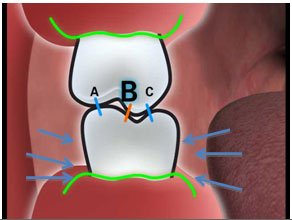We get so many people coming to see us enquiring about Flexi-dentures. They have had them in the past or their dentist has recommended them, but are the patients aware of the damage that they can be doing to their teeth? As a dentist treating friends and neighbors, I feel a responsibility to disclose these problems. This article will explain the issues with Flexi-dentures and map out the reasons we don’t recommend them to our patients.
Problems with Flexi-dentures you may know(or might not be aware of)
1. They put a lot of non-favourable pressure on your existing teeth, which will cause rapid destruction of the bone around them.
Teeth have been around for 400 million years and they have been evolving ever since to provide you with one function – chewing food. Every bit of the tooth is designed to work with and handle vertical forces like the picture shown below. It does this in an extremely efficient way, and your teeth will last a lifetime if looked after.

Teeth are great at withstanding vertical forces.
The problem with Flexi-dentures is that when you bite down, the material flexes in a thousand different directions, putting these non-vertical forces onto your remaining teeth. Your teeth are not designed to handle this force. When exerted in large quantities, it causes bone destruction around the teeth, eventually leading to tooth loss.
We know this from countless studies, yet dentists are still allowing their patients to wear these dentures that cause so many problems. Looking at the anatomy of the elastic fibres of the periodontal membrane of the tooth, 90 percent are made to withstand a vertical pressure, whereas only ten percent are horizontally arranged.

2. They are called “gum strippers” in the dental community, as they will cause damage to your gums
Where possible, dentures should be supported by teeth so when you bite down, the pressure goes onto the denture and is then transmitted down the tooth in a vertical direction. As you have read before, the tooth has evolved to withstand this pressure, and it is pretty good at doing so. Being tooth-supported means that when you bite down, the teeth will stop the denture from sinking downwards.
The problem with Flexi-dentures is that they are gum supported, so when you bite down onto them, the force (sometimes quite considerable) goes onto the denture and then goes straight onto the gums. This is bad for two reasons:
A) Your gums are not designed to deal with this pressure and so trauma will cause them to be stripped away.
B) Your gums are soft and so this will cause your dentures to sink down as you bite into them.
3. They are hard to repair when they break
Due to the molecular structure of the material, they are incredible hard to bond to. So, once they break you generally need to either send them off to a expert laboratory, which takes days to get back, or make a new one. The practicality of these options means Flexi-dentures are not a good choice.
If you would like some professional advice by true experts in this field, please give us a call on 020 8629 1226. We would be delighted to help you to improve your quality, of life and ensure our dentures improve the life of your existing teeth rather than causing damage.















